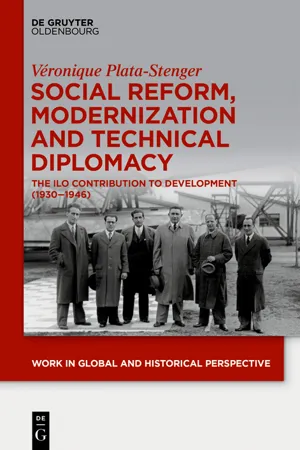
Social Reform, Modernization and Technical Diplomacy
The ILO Contribution to Development (1930–1946)
- 345 pages
- English
- ePUB (mobile friendly)
- Available on iOS & Android
Social Reform, Modernization and Technical Diplomacy
The ILO Contribution to Development (1930–1946)
About This Book
Founded in 1919 under the Treaty of Versailles as part of the League of Nations' system, the ILO is still today the main organization responsible for the international organization of work and the improvement of working conditions in the world. Widely recognized for its efforts in building international labour standards, the ILO remains little studied by development specialists and historians. This book intends to fill this gap and traces the history of international development and its early pioneers, through an analysis of the activities of the International Labour Office, the Secretariat of the International Labour Organization, between 1930 and 1946. In this book, development is used as a key to questioning the ILO's place and function in the expanding inter-war world. The development practices and discourses that emerged in the 1930s were mainly intended to support the ILO's universalization strategy, which was made necessary by the events that shook Europe at the time. Development discourses and practices were also part of the "esprit du temps", as they were closely linked to the affirmation of the planist and rationalist ideas of the 1930s. However, development for the ILO was not reduced to a project of economic modernization, but was seen as a tool for social engineering, as evidenced by the ILO's missions of technical assistance, organized since 1930. The analysis of the expertise work makes it possible to highlight the logics that prevailed in technical assistance, which was more in line with institutional objectives, than with the dissemination of a genuine expertise. This book therefore hopes to bring new insight on the history of internationalism, and international organizations during the inter-war period and the Second World War, as well as on the role of the ILO in the history of international development thinking and practices.
Frequently asked questions
Information
Table of contents
- Title Page
- Copyright
- Contents
- Acknowledgments
- Introduction
- First Part Development as a Universalisation Strategy
- Second Part Development Tools and Practices: Between Knowledge Building, Expertise and Diplomacy
- General Conclusion
- Images
- Unprinted Materials
- Index
- Subject Index